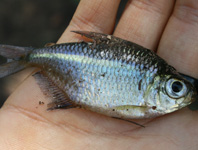Abstract
Recent expeditions to the Serra da Canastra and Chapada dos Guimarães National Parks in Brazil resulted in the collection of larvae of Argia mollis Hagen in Selys, 1865 and A. smithiana Calvert, 1909. Thus, here we describe the last instar larvae of these two Argia species from the Brazilian Cerrado.
References
Costa, J.M., Ravanello, C.T. & Souza-Franco, G.M. (2008) The larva of Argia croceipennis Selys (Zygoptera: Coenagrionidae). Odonatologica, 37 (3), 265–271.
De Marco, P. & Vianna, D.M. (2005) Distribuição do esforço de coleta de Odonata no Brasil: subsídios para escolha de áreas prioritárias para levantamentos faunísticos. Lundiana, 6 (Supplement), 13–26.
Garrison, R.W., von Ellenrieder, N. & Louton, J.A. (2010) Damselfly Genera of the New World, an Illustrated and Annotated Key to the Zygoptera. The Johns Hopkins University Press, Baltimore, 490 pp.
Garrison, R.W. & von Ellenrieder, N. (2017) New species of the damselfly genus Argia from Mexico, Central America and Ecuador with an emphasis on Costa Rica (Insecta: Odonata: Coenagrionidae). Zootaxa, 4235 (1), 1–93.
https://doi.org/10.11646/zootaxa.4235.1.1Geijskes, D.C. (1943) Notes on Odonata of Surinam IV. Nine new or little known zygopterous nymphs from the inland waters. Annals of the entomological society of America, 36 (2), 165–184.
https://doi.org/10.1093/aesa/36.2.165Lencioni, F.A.A. (2005) Damselflies of Brazil: An illustrated identification guide, 1—Non-Coenagrionidae Families. All Print Editora, São Paulo, 324 pp.
Lencioni, F.A.A. (2006) Damselflies of Brazil: An illustrated identification guide, 2—Coenagrionidae Families. All Print Editora, São Paulo, 419 pp.
Lencioni, F.A.A. (2017) Damselflies of Brazil: An illustrated identification guide: Southeast Region. Jacareí, São Paulo, 559 pp.
McAlpine, C.A., Etter, A., Fearnside, P.M., Seabrook, L. & Laurance, W.F. (2009) Increasing world consumption of beef as a driver of regional and global change: A call for policy action based on evidence from Queensland (Australia), Colombia and Brazil. Global Environmental Change, 19 (1), 21–33.
https://doi.org/10.1016/j.gloenvcha.2008.10.008Machado, A.B. & Bedê, L.C. (2015) Two new genera and nine new species of damselflies from a localized area in Minas Gerais, Brazil (Odonata: Zygoptera). International Journal of Odonatology, 18 (4), 269–296.
https://doi.org/10.1080/13887890.2015.1072113Novelo-Gutiérrez, R. (1992) Biosystematics of the larvae of the genus Argia in Mexico (Zygoptera: Coenagrionidae). Odonatologica, 21 (1), 39–71.
Palacio, A.D., Lozano, F. & Muzón, J. (2018) Description of the final instar larva of Argia serva Hagen in Selys, 1865 (Odonata Coenagrionidae). Anais da Academia Brasileira de Ciências, 90(3), 3017–3022.
Rasband, W.S. (1997–2018) ImageJ. U. S. National Institutes of Health, Bethesda, Maryland, USA. Available from: https://imagej.nih.gov/ij/ (accessed 28 August 2018)
Santos, N.D. (1968) Fauna do Estado da Guanabara. 64—Descrição da ninfa de Argia sordida Selys, 1865 (Odonata, Coenagrionidae). Atas da Sociedade de Biologia do Rio de Janeiro, 11 (6), 227–228.
Watson, M.C. (1956) The utilization of mandibular armature in taxonomic studies of Anisopterous nymphs. Transactions of The American Entomological Society, 81, 155–205.
Valente-Neto, F., de Oliveira Roque, F., Rodrigues, M.E., Juen, L. & Swan, C.M. (2016) Toward a practical use of Neotropical odonates as bioindicators: Testing congruence across taxonomic resolution and life stages. Ecological Indicators, 61, 952–959.
https://doi.org/10.1016/j.ecolind.2015.10.052Vilela, D.S., Guillermo-Ferreira, R. & Del-Claro, K. (2016) The Odonata community of a Brazilian vereda: seasonal patterns, species diversity and rarity in a palm swamp environment. Bioscience Journal, 32 (2), 486–495.
https://doi.org/10.14393/BJ-v32n2a2016-30491Vilela, D.S., Guillermo-Ferreira, R., Del-Claro, K. & Cordero-Rivera, A. (2018) Argia angelae (Odonata: Zygoptera: Coenagrionidae) sp. nov. from Chapada dos Guimarães, Mato Grosso, Brazil. Zootaxa, 4415 (3), 549–560.
https://doi.org/10.11646/zootaxa.4415.3.8

